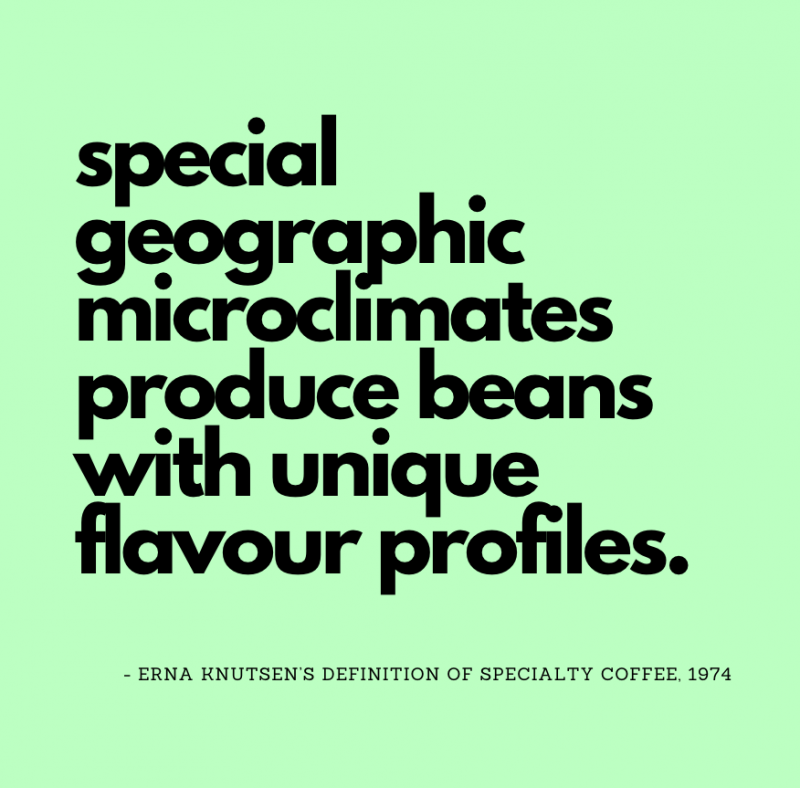Words by Kate Burnett

In 1982, what we now know as the Specialty Coffee Association was founded. According to the their website, “…the term ‘specialty coffee’ was first coined by Erna Knutsen, of Knutsen Coffee Ltd., in a speech to the delegates of an international coffee conference in Montreuil, France in 1974. The concept was quite simple: special geographic microclimates produce beans with unique flavour profiles.”
What followed in the 1990s and early 2000s was a movement towards quality over quantity, this is known as the “third wave” of coffee consumption and production. The stamp “specialty” represented an ideology and a particular line of ethics regarding responsible sourcing and artisanal roasting. Transparency and traceability were now highly valued, and the specialty coffee industry followed in the footsteps of the wine or craft beer industry.
Specialty coffee emerged as a movement away from instant and commodity coffee. It was a niche product that attracted the most discerning and “nerdy” flavour and quality enthusiasts. Trained specialists, known as Q-graders, evaluate coffees on a scoresheet of 100 points. A coffee is classified as “specialty” when it scores 80 or more points on this score sheet.
Today, the “fourth wave” of specialty coffee has seen an increase in experimental processing, coffee competitions have emerged as a platform for excellence and innovation and exploration of brewing and producing has deepened significantly.
But does the word “specialty” still truly represent all of those things? If you walk down a busy street of cafes and restaurants in almost any city in the world, you’re bound to see the word “specialty” plastered all over menus and signage. The word is being used to suggest a higher quality of coffee drink, and many consumers now associate the word “specialty” with a particular style of drink, rather than the quality of coffee beans being used in the drink. For example, the word “specialty coffee” is often used above a list of flavoured and complex drinks to indicate that the drinks are a café’s specialty or unique recipe. This has led to a looser and looser definition of “specialty coffee”.
The word “specialty” has become a substitute for “more interesting than normal”, “more expensive than normal”, or simply “what we specialize in”. These new associations are founded in the original associations with quality and flavour, but don’t carry the same weight as the sure-fire stamp of scoring 80 points or above by a qualified expert.
The misconceptions around the word have left the producers, roastery’s and cafes in the specialty coffee industry without a word to truly encapsulate what it is that they do and why. “Specialty” is used as an interchangeable buzzword by any and all coffee businesses, but where does this leave those focusing on the true definition? Communication between the new specialty customer and the specialty coffee industry has become trickier because of this.
Language changes over time. Words and phrases morph into what they are being used for, and after a certain time period, come to mean something completely different. This is where “specialty coffee” is now and has been for some time.
Specialty coffee has been known to be snobby and exclusive. The idea of being sneered at for being unable to identify a bourbon from a gesha has turned away many-a-potential customer and closed the minds of many more. As much as the new uses of the word have perhaps diluted the true definition, it is undeniable that it has put the concept of specialty coffee onto the radar of many more people. “Specialty” was scooped up by multinational coffee businesses, and they ran with it. These companies are the marketing experts that the artisanal roasters, producers and baristas weren’t at the time. Although the true values and definition of specialty was lost, the word was in front of the general public in a way it hadn’t have before. Although the nuance was lost, “specialty” stood for “good coffee”.
Perhaps now it is up to those same artisanal roasters, producers and baristas to teach that “good coffee” should mean a certain level of flavour quality, transparent trade and traceability. Communication and education around specialty coffee has become a focus for many specialty coffee businesses, and trends in conscious consumption have opened the door for this communication. Perhaps this increased openness will open the conversation and settle the historic confusion around the word and its associations.